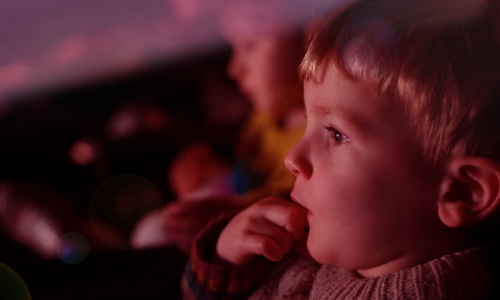
My favourite thing to do during an evening – or indeed at any time – is go to the cinema with a glass of white wine. My happy place is there: sitting in the dark, with no one asking me to bring them a snack or do anything for them at all for 90 blissful minutes. I love it so much that it doesn't really matter if the film is good or not (though obviously it’s a bonus if it is).
Sadly, my two sons – aged 14 and nine – haven’t always shared my love of going to the cinema. The main issue for them is having to sit still. Both are autistic and both have ADHD, so having someone tell them to stay put for 90 minutes, and not talk, is far from ideal.
In recent years, however, a compromise has been made available in the form of autism-friendly screenings. Here's why I think they're a great idea...
Cineworld's autism-friendly screenings generally feature family-friendly movies, and in most cases are held on the first Sunday of each month at 11am. For more information, click here.

You're allowed to move
Whoever came up with the idea that you should sit still for 90-plus minutes was clearly a neurotypical (someone who isn’t autistic or doesn’t have ADHD). At autism-friendly screenings, you’re allowed to get up, fidget or have a quick chat* – all of which can help neurodivergent people regulate their sensory system. Movement and respite from focusing on one thing can help them get back to the task at hand – in this case, watching the film. Without those things, their energy can be taken up trying to remain unnaturally still or feeling under-stimulated, which can make it impossible to follow what's happening on screen.
The volume is turned down
I recently watched a TV documentary, The Stimming Pool, that had been created by a group of neurodivergent filmmakers. One section of the movie aimed to portray what a visit to the pub feels like for autistic people by turning up the volume so high that it was uncomfortable for viewers. By doing this, it effectively conveyed what it’s like having to deal with a more chaotic and intense sensory environment: basically, it can stress you right out.
Happily, the volume is turned down at autism-friendly screenings, meaning that my children are less likely to jump out of their skin when something dramatic happens. That said, some autistic people love the volume turned up loud, which just goes to show that there’s no ‘one size fits all’ solution for a large, diverse group of people with the same brain type.
One thing I have noticed about autism-friendly screenings, though, is that they dim the lights in the auditorium rather than switch them off. I’m not sure why this is because most autistic people I know rush home from school or work and head for a dark room to try and regulate themselves for as long as they can get away with. Maybe that’s something that cinemas could take on board.

Autistic people can be themselves…
Relaxed screenings are a place where autistic people, and those living with ADHD, can be themselves without having to mask their neurodiversity, and this is so valuable. Usually, our family has to fit in with the non-autistic world, so being able to visit a cinema where we don’t have to impose neurotypical rules on a neurodivergent young person is a relief.
…And you can, too
The above point means that not only can my kids relax, but I can too. When you have children who find it difficult fitting into society’s norms, you’re presented with a choice. Either you enforce rules that don’t work for your child (bowing to the expectations of people you don’t know) or you try to ignore it all and do what’s right for your family, which can be hard if you’re a natural people-pleaser, which I am. So, being in a situation where you don’t have to worry about any of this is obviously a relief.
So, let’s celebrate a great initiative – making cinema accessible to everyone – and continue to fine-tune it, with neurodivergent people guiding what they want from their relaxed screenings.
As for my family, I just want my two to be alive to the idea that the cinema can be a refuge from a world that’s sensorily hostile, and that doesn’t always understand you. In a busy, noisy and demanding world, autism-friendly screenings have become somewhere to go to counter all of that.
Jessie Hewitson is the author of Autism, How to Raise a Happy Autistic Child and the soon-to-be published ADHD, How to Raise a Happy ADHD Child. Both are published by Orion.
* While autism-friendly screenings offer a relaxed environment where moving around is absolutely fine, we encourage consideration and sensitivity towards other people in the auditorium



.jpg)
.png)






